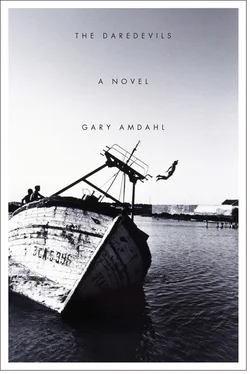“Jules Beveridge.”
“—suggested we visit Seville and Florence someday, see the loggias and porticos and so on. ‘I’m not even sure what those things are or where those places are in the world,’ Rosemary admitted with candor equal to my own, ‘but I’d go there in a second. Anywhere in the world, I would.’ She squeezed my hand. ‘With you.’”
“Jules wondered if there was a lift to the top of the tower. Thirty-two stories seemed a great deal to ask, especially without authorization, but it turned out that we could get to the parapets and columns surrounding the little space, the lantern, it was called, beneath the many-tonned but mobile Diana, almost without moving a muscle. Thus was the horrible noise of the city swallowed up. It was another world altogether. The city was not real. All we could hear was a faint but steady grinding of stone on stone, and the wind, buffeting one ear and then, turning to consider another aspect of the island city, the other. The arm of the ancient goddess moved above us, in the upper corners, as it were, of our eyes. There were fewer and fewer people in the lantern lookout, night had swallowed up the city, there were only a few floating streams of light. ‘Or we could just stay up here,’ murmured Rosemary. Jules had his arm around her. ‘We could move to San Francisco.’ ‘Yes,’ he said. ‘We could just stay up here. We could move to San Francisco.’ Diana groaned and creaked in the darkness and stone just above our heads. A week or two later, up in the lantern again, Rosemary had an idea, an image of something that might happen and somehow matter. We went down a flight of narrow stairs, painfully, then another and another until they came to a room that appeared to cater to unused utility: electricity! And based on what Jules thought he understood from his engineers he had come to know and to talk to about this and that, he thought it could easily be drawn from this room. A little old man, so quiet and still we hadn’t known he was in the room, Rosemary and I at least, Jules giving a faint impression of prior meetings if not old acquaintance, began to speak from a tiny triangular desk in a dark corner. When Diana had been unveiled twenty years earlier, they had draped her legs and belly with ten thousand incandescent electric bulbs, so that her lovely breasts and forbidding face could be seen by anyone who cared to look up, all night long. Jules said we were associated with the Paterson Silk Strike Pageant, which would be performed in less than a week, surely the old man knew of this spectacle? Yes, yes, he thought he did. Well, we were wondering if Diana might be somehow relit, to help us advertise our show. The old man said that she would be lit now, lit eternally, if he had anything to say about it, but that the scandal of gigantic titties lighting up Manhattan, mesmerizing people and drawing them nearer and nearer her magnificent safety like a lighthouse — it had been too much for decent people to bear. Three hours later we were in the offices of the Passaic Weekly. Rosemary took care of a neglected duty — using a typewriter to make daily reports of news gathered shop by shop, job by job, everybody from the native-born, highly-skilled, and relatively well-paid ribbon workers and weavers, to the immigrant loomfixers and twisters and horizontal warpers — while Jules and I sought and found old light-bulb boards, electrical wire, flashers, and fuses. When he had everything he thought he needed, we hired a wagon, though it was nearly midnight now, and brought it all to the apartment in the Village he shared with John Reed, put as much as we could in three suitcases, and locked them in his bedroom. Then we had a late supper. It was the first time in our lives when we could count on all the food we wanted whenever we wanted it, and we never tired of eating. When we finished eating, we walked to the Garden and ascended the tower once more. It made all the sense in the world as we listened rapturously to the sound of the goddess atop her little six-pillared lantern, grinding from one minute of perspective to the next. Here is what I see now. Here is what I see now. Here is what I see for a moment then never again. The lantern was evidently something of an attraction and was filled with people even at that late hour, the lift going ceaselessly up and down, up and down, up and down, but Jules was quite sure there would be a slack period in the wee hours when they could rig their lights. Secreting the contents of the suitcases wherever we could, here and there in the tower’s highest rooms, another three suitcases each day, we waited for opening night.”
“An exhibition of the latest art was on display at the Armory. Jules, with whom, yes, as you have been suspecting, I had fallen hopelessly in love, he was so handsome and capable and so clearly desirous of the kind of life I had slowly been working up a description of with my friends, had seen many paintings and sculptures in his life, and been moved by a few, but Rosemary and I had not. But because the work in the Armory was new to everybody, Jules found no precedent for it in his imagination. He therefore thought he did not much care for most of what he saw, but as he and I and Rosemary walked — Jules and Rosemary hand in hand, me waiting patiently for the time when I knew someone would snatch Rosemary away and Jules would turn to me in astonished love, as if a storm had passed and I was the one who was still there — from one curtained gallery to the next, under the canopy of bright yellow streamers billowing up into the darkness of the somehow still military ceiling, amid the boughs and sprays of evergreens and baskets of flowers, I think he could not help but feel some of our amazement and excitement: the tumbling but suave sweep of geometric shapes in Duchamp’s mockery of the ‘cult of big women,’ Nude Descending a Staircase, No. 2, the strange but vivid, too-vivid colors and objects in Matisse — I heard someone call it ‘epileptic’—the hallucinated landscapes of van Gogh. No, he could not deny what I was saying with such conviction: the affinity many of the paintings had with narcotic perception, or with narcotic thought, with what it was like to work in a mill. And so he was annoyed for our sake to hear people buzzing in every room about what former president Roosevelt — had he just been there, and if so, how had we missed him? — had said, suggesting Americans take the work no more seriously than they did P. T. Barnum’s mermaids. Which was to say, somewhat seriously, as you could look far and wide and not find a more striking, beloved, archetypical example of an American than Barnum, but skeptically or at arm’s length, with tongue in cheek, with an eye toward amusement and belly laughs rather than edification and sublimity. Certainly there was more repugnance than beauty in much of the work. One left a canvas too often irritated and confused, and there was even a sense of outright falseness in every one of the eighteen octagonal rooms, either the result of ineptitude and childishness, or the calculated deceit of a huckster. But Rosemary and I were thrilled with the recognition of something essential in our lives. She was holding my hand tightly now, and could say little more than oh oh ohhhh, as if she were having an orgasm — a sensation I could not help but feel drawn closer and closer to myself. We could only be responding, in our completely untutored, inexperienced way, to what we sensed was the life in the paintings. That too Jules could not deny: there was life and ecstasy in them, some of them. There was life somewhere. He could smell it. It stank but it was alive. I shivered. And then we came to Odilon Redon, whose first works were ridiculous and grotesque: the huge grinning spider, the hot-air balloon that looked like an eyeball, worms and deliquescent flowers, the puerile doodlings of a bored but gifted little boy. A sad, creepy Cyclops. Six lithographs inspired by Poe. Rosemary drifted away. When she came back, her face was clouded. She stood over us and we could see her eyes were wet and that tears had run down her cheeks. Then she smiled and it seemed the tears were of joy. She pulled us to our feet and told us he must come and see The Druid Priestess. She was in profile, and her head and neck and shoulder were clothed in a kind of silken fluid gold that became a reddish orange on her arm. Her jaw and cheek were darkened, and at first glance she would be taken for mannish, the dark staining an early growth of beard. But then it began to look more as if she were made of wood, the lower part of her face darkened with age or mold, or the nose and large dark eye and forehead bleached by the sun. The blue, green, and black background suggested a luminous forest at twilight, and there was a spattered yellowish moon in the upper left corner. Her golden hood appeared to be raining around her. Her eye grew deeper and darker, her sharp nose and thin lips more feminine. Hair flowed from under the golden rain, like a deeper, darker current. We were hypnotized. ‘I think that’s my grandmother,’ said Rosemary. ‘She is a strange but lovely woman,’ said Jules. ‘Grandmother,’ I repeated reverently. We waited for a large group of murmuring people to pass into the next room, then swung around the burlap-covered partition wall and came face-to-face with the first of the horses. It was a dark, earth-brown and gold demonic Pegasus, embroiled in its own fury, writhing and contorted as it struggled to fly, or having flown, to not fall. Next was a silver and white Pegasus, rearing up on a black, blue, and silver mountaintop, majestic, magical, and beautiful — but alone. The winged horse and rider in Roger and Angelica, or Perseus and Andromeda, was purely golden, with very small wings. A kind of wormy serpent and mutant fish monster — possibly the Medusa but possibly not — menaced them in the blue clouds. We decided these paintings were beautiful, but troubling, and admitted we had become distinctly uneasy. Finally we came to The Chariot of Apollo. There was the blue sky again, now frighteningly blue — not dawn, not noon, not dusk, not midnight — and the white horses in agony. Only a small smear of the sky was that shade of strange bedlam blue; the clouds were brown and green, as if the world were upside down, and the chariot, stolen from Apollo by the brash young reckless Phaeton. seemed to be falling. Phaeton’s head appeared to be on fire, and the chariot was falling.”
Читать дальше












